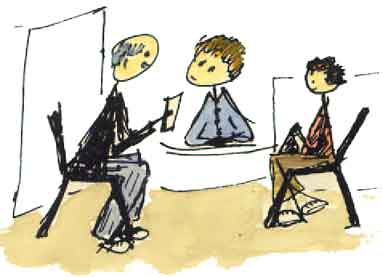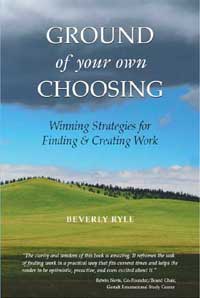Tag
Why Businesses Fail, Part 1: Know Your Market
Ask small business owners why some of them fail and they'll tell you it's because they don't make enough money. This makes about as much sense as saying that Enron went under because the price of its stock fell.
It begs the question, why don't they make enough money, and misses the opportunity to seek out fundamental causes like:
- Financial projections based on wishful thinking rather than real numbers and actual market conditions.
- Failure to articulate and communicate the value of a product or service.
- Inadequate professional development of the owner or manager
I Feel Pretty
 As I rushed home to catch Andre Agassi in the final stage of his transformation from tennis celebrity to endearing human being at the US Open last month, I was looking forward to the tennis, but dreading the commercials.
As I rushed home to catch Andre Agassi in the final stage of his transformation from tennis celebrity to endearing human being at the US Open last month, I was looking forward to the tennis, but dreading the commercials.
Yet much to my surprise, one of the ads spoke to me with the power and precision of a 130 mph ace about a phenomenon that universally limits human potential—labeling.
In the ad, we see an attractive young woman (Maria Sharapova) entering the Waldorf Astoria in New York, walking through the lobby, emerging from her room after a change of clothes, getting into a cab outside the hotel, and arriving at Arthur Ashe stadium.
She moves with a straightforward, I-know-where-I’m-going demeanor past doormen, desk clerks, elevator operators, business men, security guards, etc., and each person she passes sings, in his or her own cracking, out-of-pitch voice, Stephen Sondheim’s tribute to being female from West Side Story, “I Feel Pretty”.
Work Search as Consultative Sales
 In last month’s column I described how a consultative sales approach made it possible for employees who were unaccustomed to functioning as salespeople to be effective in that role.
In last month’s column I described how a consultative sales approach made it possible for employees who were unaccustomed to functioning as salespeople to be effective in that role.
A consultative sales approach is just as valuable to people who are engaged in work search, whether they have been laid off or have chosen to go out on their own. After all, work search is sales, and many people who find themselves thrown into it feel out of their element.
Yet they can be effective and comfortable in selling themselves if they pattern their work search on a consultative approach rather than aggressively cultivating leads and pushing to close the deal.
The Kinder, Gentler Way of Consultative Sales
 In last month’s column I talked about how educated consumers are bringing about the extinction of the hard-driving salesperson at the same time that businesses are facing unprecedented competitive challenges.
In last month’s column I talked about how educated consumers are bringing about the extinction of the hard-driving salesperson at the same time that businesses are facing unprecedented competitive challenges.
It makes perfect sense for businesses who are trying to stay profitable in this new environment to set the goal of having every employee contribute to the revenue stream. It’s the lifeblood of the organization. But forcing an aggressive sales model onto people who aren’t ready for it is counterproductive. Trying to get “non-sales” people to sell in a way that is not comfortable for them, and is no longer effective anyway, just isn’t going to work.
It leads to the loss of people who have built invaluable relationships with their customers over time, and it overlooks qualities that make them ideally suited for building new relationships that will assure long-lasting revenue streams.
A Few Dinosaurs Still Roam (Mostly in Car Dealerships)
 There’s good news for those of us who think we can’t sell. The salesman as we have known him is becoming extinct.
There’s good news for those of us who think we can’t sell. The salesman as we have known him is becoming extinct.
The unprecedented access to information that is available at our fingertips on the Internet and elsewhere is causing his habitat of hype, bravado, and manipulation to shrink, and soon he will disappear.
He’s met his match—the educated consumer.
Mining Peak Moments
 We've become accustomed to hearing the story of a professional life told almost exclusively in terms of outstanding accomplishments.
We've become accustomed to hearing the story of a professional life told almost exclusively in terms of outstanding accomplishments.
Ask an athlete to reflect on his career and he'll tell you about the time he pitched a no-hitter. Ask an actress and she'll talk about landing the lead in a Tony-winning Broadway play. Ask a writer and he'll recall how it was his third novel that lifted him from obscurity and made him a best-selling author.
These public, universally acknowledged achievements, which everyone recognizes as peak moments, are what we've come to expect when someone looks back on their life.
Career Autobiography
 There’s a lot we can learn from the stories of our professional life—if we tell them in a way that enables us to hear what they really have to say to us. Too often we are satisfied with forcing our career stories to fit the mold of a resume, which is a formal exercise with a fixed external purpose (i.e., getting a job).
There’s a lot we can learn from the stories of our professional life—if we tell them in a way that enables us to hear what they really have to say to us. Too often we are satisfied with forcing our career stories to fit the mold of a resume, which is a formal exercise with a fixed external purpose (i.e., getting a job).
A career autobiography, on the other hand, is a free-form narrative with an evolving internal purpose.
When we begin to tell our career stories as stories instead of trying to make them conform to some predetermined set of specifications, we make discoveries about ourselves and tap the springs of our internal wisdom.
Authenticity as a Competitive Edge
 We may not be to breadlines yet, but unless you've been in a coma or you're independently wealthy you probably can't help noticing that these are hard times. Job "insecurity" is affecting all but the highest rungs on the employment ladder.
We may not be to breadlines yet, but unless you've been in a coma or you're independently wealthy you probably can't help noticing that these are hard times. Job "insecurity" is affecting all but the highest rungs on the employment ladder.
The economic repercussions of 9/11, the ongoing replacement of people with technologies, the outsourcing of ever-growing numbers of manufacturing and service jobs to foreign countries, all are making it harder and harder to feel confident that America is still the land of opportunity. And this is true even for those of us with a good education and in-demand skills.






